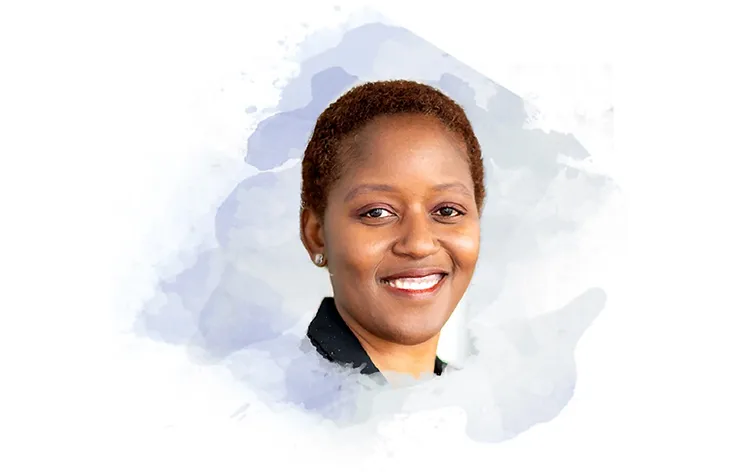Christine Miller is the President, Chief Executive Officer, and member of the board, Melinta Therapeutics, speaks to us about her path into the pharmaceutical industry, her mission to end antimicrobial resistance, and how to be an effective leader in pharma today
Interview by GOLD
You have a background in chemical engineering as well as an MBA. How did this background lead you to a career in the healthcare and pharmaceutical industries?
When I was at school, there were about three professions you would go into as a chemical engineer: pharma, gas and petroleum, or chemicals. I come from a family with a long history in healthcare, so when I was offered an internship at Merck in research and development, I jumped at the opportunity. I was really drawn to George Merck’s quote “medicines are for the people, not for the profits.” So, from 18 years old, I knew that pharma was where I wanted to be. I wanted to help people live better lives through problem solving. The MBA helped with strategy; it enabled me to discover what were good strategies for helping people live better lives.
Antimicrobial resistance is expected to bring about the next major public health crisis. While Melinta Therapeutics is uniquely focussed on the development of novel antibiotics, how can the industry as whole be incentivised to further invest in these less lucrative but vital drugs?
Unfortunately, about 95% of the research that happens for antimicrobials is done by small biotech companies. The root cause is that current policies disincentivise hospitals to use innovative antimicrobials. Right now, hospitals receive a fixed reimbursement amount based on diagnosis code, regardless of the drug given to the patient. So, they tend to use older, lower-priced drugs on patients first. I’m on the Executive Committee of the Antimicrobials Working Group, which is a coalition committed to advancing public policy that tackles these issues head on. One of the ways we’ve been taking action is by meeting with members of
It’s important to stay tied to what you believe in and let that drive you every day
Congress and educating them about AMR and the DISARM Act (Developing an Innovative Strategy for Antimicrobial Resistant Microorganisms), which would provide for additional reimbursement outside of the Medicare payment system for new antimicrobial drugs. This policy reform would be one big step toward increasing patient access to innovative antimicrobials, and by doing that, we’re simultaneously creating an environment that will entice companies to invest in the AMR innovation we need to address this global health threat.
You have overseen more than 50 product launches in your impressive career. What is the winning formula to achieving a successful drug launch in the current climate?
The first thing is that your medicine needs to have the ability to address an unmet need, such as lack of innovation in the area, cures, prolongation of life, or an access issue. Then, you need to show healthcare practitioners how your product is addressing that unmet need. The FDA exists to ensure that your product is safe and efficacious, but you need to demonstrate your value proposition. Then, there’s execution; you need a high performing team to execute the strategy. I always joke that if you have a high performing team, no matter what strategy you give them, they are going to do a fantastic job. So, make sure that you have a really high performing team, and then it is execute, execute, execute.
You are an Advisory Board Member at the Healthcare Businesswomen’s Association. How has your time with this network shaped both your perspective and ambitions?
The HBA is a fantastic organisation. I remember my first HBA event about 20 years ago, I walked into this ballroom and there were hundreds of women there, many up on the platform speaking. There were not a lot of women leaders back then, so it was very inspiring. For their last event, I was the MC, and during rehearsals, I was so inspired by Sharon Callahan, Chief Client Officer of Omnicom Health Group, that I could not catch my words to go next.
She shared a woman’s experience within the industry that resonated with me, especially being a black woman. It was about a woman [of colour] who was mistakenly perceived as being in a meeting to take notes. She was the Vice President of Quality. I can relate to people assuming they do not belong, but we all belong. When I decided to make a career change in 2019, I went up to Laurie Cook, the former CEO of the HBA, and she immediately started pulling people, calling people, and making connections for me. To know I have that support is so empowering.
You have said that power comes from purpose. How is the notion of power and leadership commonly misunderstood in the workplace and why is purpose so important?
People often see power as a negative thing; they see power as when someone has control over other people or control over resources. I believe that power comes from within and it is fuelled by your purpose. If you know what you are here to do, then there is an innate power in that. This is especially relevant in the current climate because millennials and Generation Z are not motivated in the same way that older generations were motivated. So, if you try to lead people through command, control, and power, that is not going to work. If you focus on helping people to figure out what motivates them, that is going to inspire them to do what needs to be done.
Do you have any daily practices that you would recommend others integrate into their day-to-day to remain productive, focussed, and grounded?
First of all, I’m a person of faith, but no matter what you believe, I think it is important to stay tied to what you believe in and let that drive you every day. I do daily devotionals every morning as well as prayer and meditation. I think many people are afraid of quiet. They are afraid that if they stop, things will fall apart, but it is actually quite the opposite. The quietening of your mind is restorative. Also, sleep is important. A group of women approached me once and said, so when do you sleep? Their assumption was that to be a leader you do not sleep. There are leaders who perpetuate that idea, but for me to be the best leader, I need to be my best self. If that spills over into me being a great leader, that is great, but actually, my goal is to be the best human being I can be before anything else.








